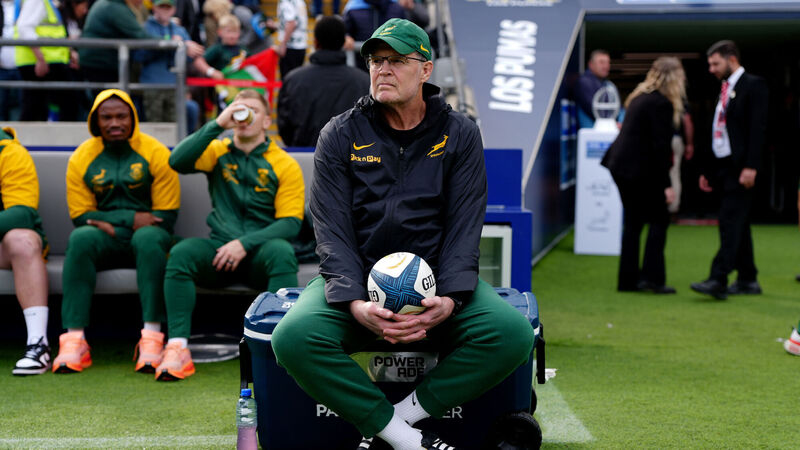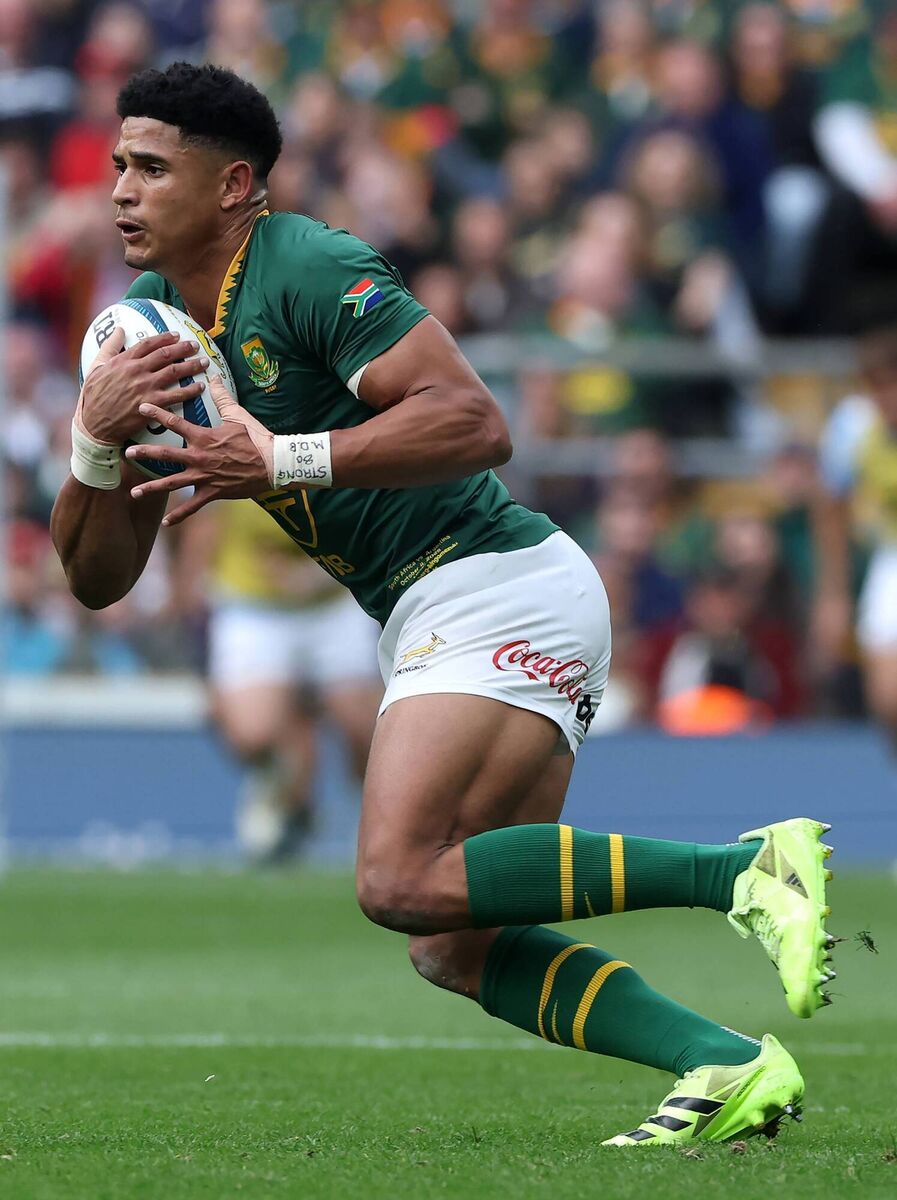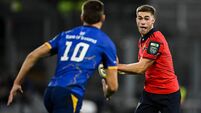Donal Lenihan: Once more, Boks doing some serious block building

South Africa head coach Rassie Erasmus ahead of the Rugby Championship match at the Allianz Stadium. Pic: David Davies/PA Wire.
It's good to be back, fresh from a heart-warming summer of great weather with a new season that promises a lot and will reveal much about the current state of Irish rugby.
It’s hard to believe Andy Farrell has already reached the half-way point in preparations for the 2027 World Cup, staged in Australia for the third time since the inaugural event they shared with New Zealand back in 1987.
The union game has changed dramatically since that historic event — the most significant development, the transformative move to professionalism taken in the immediate aftermath of the seismic 1995 World Cup, won by South Africa in their first tournament.
While the Springboks won a classic final against New Zealand courtesy of an extra-time drop goal by Joel Stransky to capture the Webb Ellis Cup for the first of four World Cups to date, Ireland still await a first semi-final appearance.
So where does Farrell’s squad, set to be announced today, sit two years out from the next tournament? The forthcoming November series, with challenging Tests against New Zealand, Australia, and South Africa, will prove informative on that front.
Current evidence suggests Irish rugby is in a good place right now; a big indicator being the amount of players that featured for the Lions in Australia — 18 in total by the end — on a tour that may yet prove a valuable precursor for what’s coming down the track in two years time.
The most pressing concern for Farrell is the age profile of some key performers in James Lowe, Bundee Aki, and Jamison Gibson-Park — who will be 35, 37 and 35 respectively by the time the World Cup rolls around.
What Farrell needs right now is the emergence of fresh faces capable of putting pressure on that trio for starting places in the Irish team.
From that perspective, a promising start to the season by Munster’s Craig Casey — emboldened by his elevation to the Irish captaincy for the summer tour of Georgia and Portugal — will be interesting.
That said, given the consistent excellence delivered by Gibson-Park for the Lions in the series win over the Wallabies, Casey will have his work cut out to displace Ireland’s regular scrum half.
Running parallel with the Lions expedition was the two-game sojourn undertaken by a young Irish squad with Paul O’Connell as interim head coach.
Whatever about the notable 5-34 win over Georgia in Tbilisi, the value of a facile 7-106 win against Portugal remains questionable. I reckon any one of the AIL 1A semi-finalists from last season would have given that Portuguese side a decent run for their money.
History has taught us that players often struggle with form, fatigue, and injuries in the season following a Lions tour. While the IRFU are best in class when it comes to looking after their players, sometimes things are outside of your control. It will be interesting to see how things unfold on that front as the season progresses.
What we can say with certainty is that an autumn series encompassing Tests against the three southern hemisphere giants, whose recent performances in the most competitive Rugby Championship ever, will be fascinating to follow a month before the 2027 World Cup pool draw will be finalised.
The fact that every side showed a capacity to beat the other, with Australia and Argentina proving far more competitive than in recent tournaments, added immensely to a competition so often dominated by the Springboks and All Blacks.
The standard of attacking play displayed by all four teams was brilliant to watch. In that respect, the evolution of the Springbok attack under former All Black out-half Tony Brown has added a new dimension to Rassie Erasmus’s side.

Added to their traditional brute force up front, the variety of threats posed by South Africa out wide eventually proved too hot for all opposition to handle as the tournament progressed.
Not only have they retained a suffocating scrum, quality line out and explosive carrying ability that enables them dominate the gain line, the Springboks have added a degree of sophistication in attack that enabled them out score New Zealand 36-0 in the second half in an incredible performance in Wellington — eventually defeating their hosts by a record margin of 33 points.
After defeats to Australia in Johannesburg and New Zealand in Auckland, many were far too hasty in writing off the current back-to-back world champions. Given the depth and quality of their squad, I felt it was far too premature to go down that road.
The fact that Erasmus dropped 12 players who started the 24-17 loss in Auckland — hardly a shattering defeat — because he was dissatisfied with their individual and collective performances, the facile win that immediately followed in Wellington only served to highlight further the depth of his resources.
Erasmus picked a team without so many stalwarts from his World Cup successes. Eben Etzebeth, Bongi Mbonambi, Frans Malherbe, Handré Pollard, Jesse Kriel, Willie le Roux, and Damian de Allende were all deemed surplus to requirements — yet the Boks proved their quality by taking the Kiwis apart.
Just look at the quality of second rows that featured in the Rugby Championship alone. Etzebeth, the greatest Springbok lock of all time, didn’t even make the bench for that 10-43 hammering in Wellington. No worries, Erasmus started Lood de Jager and the excellent Blue Bulls captain Ruan Nortje.
When De Jager was forced off injured after only nine minutes, Erasmus was able to call on none other than Leinster’s RG Snyman to fill the gap. He was outstanding. Earlier in the campaign, double World Cup winner Franco Mostert also started.
Prior to that, in warm-up game against the Barbarians and summer Tests against Italy and Georgia, Cobus Wiese, Stormers captain Salmaan Moerat, and Munster’s Jean Kleyn also featured. Eight quality locks in total.
Likewise in the key position of out-half, Handre Pollard, Manie Libbok, and — potentially the most gifted of them all — Sacha Feinberg-Mngomezulu, who scored a record 37 points including three tries against Argentina in Durban, all made their presence felt in contrasting ways, which is exactly what you need from your stable of 10s. In total, the Springboks used 36 players across their six Rugby Championship games.
Right now, New Zealand lack the aura of their great teams of the past and their union may have to reconsider their decision not to select overseas-based players if they want to match South Africa in terms of depth chart.
As we witnessed by the end of the Lions tour, Joe Schmidt continues his impressive overhaul of Australian rugby to such a degree they will be serious contenders by the time the World Cup rocks up, on the premise that they keep the former Ireland coach on board in some form of consultancy role having already announced Les Kiss as his successor after the November series.
On the provincial front, the appointments of Stuart Lancaster and Clayton McMillan in Connacht and Munster respectively has added a new dimension to the coaching box.
McMillan has already overseen an unbeaten start to Munster’s season, with 14 from a possible 15 points accumulated from their opening three URC games, despite underperforming in two of those.
Their best performance, a 21-34 win away to the Scarlets, was put into context however, on Friday night when the Stormers travelled to Llanelli and won 0-34.
Saturday’s visit to Croke Park to face Leinster will prove a lot more revealing in terms of where Munster’s journey is headed right now.
Having heavily rotated his squad in the opening games, McMillan will head to Dublin fully locked and loaded and, as a consequence, will have a better idea of the challenges ahead of him.



